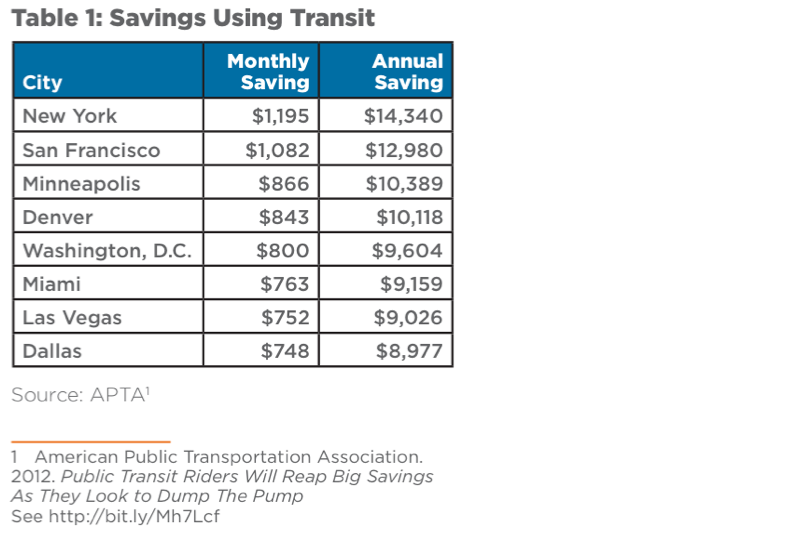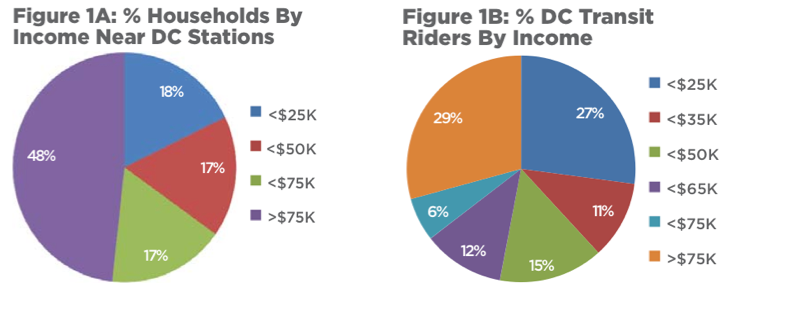RECONNECTING AMERICA
The United States has entered an era marked by fiscal constraints, national economic restructuring, and major demographic shifts. Communities of all sizes — urban, suburban, and rural — must find ways to do more with less, while still meeting their residents’ daily needs. Transit agencies, metropolitan planning organizations, and city and county governments are all operating with limited funding, while at the same time attempting to integrate housing and transportation plans, improve existing infrastructure, and plan for the future. This policy brief compiles recent research to demonstrate that one of the most economically efficient strategies for providing public services is to ensure that housing near public transportation is affordable to people with a range of incomes.
The Economic Benefits of Affordable Housing
Affordable housing can create millions of dollars in economic returns for communities. While there may be an upfront public cost of providing affordable housing, there are also significant economic benefits that accrue from such housing. A literature review prepared by the Center for Housing Policy shows that developing affordable housing benefits the local economy by:
• Creating jobs and spending in the local economy both during construction and after the homes are occupied.
• Attracting both new employers and a skilled workforce by having a sufficient amount of affordable housing in proximity to jobs.
• Increasing revenues for states and localities through fees from permitting, zoning, utilities, and property taxes.
• Reducing government spending by promoting sustainable and stable homeownership opportunities, which reduce the risk of foreclosure and delinquencies.
Research further points out that the number of jobs created from an affordable housing project is comparable to the number created during the building of a market-rate development. In the Denver metro area, 615 affordable housing units built with low-income housing tax credits (LIHTC) resulted in annually recurring impacts beyond the first year of $16.7 million in local income, $2.3 million in taxes and other revenues for local government, and 192 local jobs.

The Economic Benefits of Transit
A stable public transportation system is the basis of many successful economies. For every $1 invested in public transportation, $4 in economic returns is generated. Transit can create and support jobs, increase property values, stimulate development, boost local and state revenues, and conserve energy if the right investments are made.
• Public transit creates jobs: Every $1 billion in public transportation investments creates 36,000 jobs.
• Public transit stimulates development: In Portland, more than $8 billion of new development has occurred adjacent to light rail station areas.
• Public transportation boosts business revenue: Business located near the light rail line in Dallas experienced a 33 percent increase in retail sales, compared to 3 percent growth overall in the city.
• Public transportation benefits local and state revenues: Every $1 billion invested in public transit generates nearly $500 million in federal, state, and local tax revenues from added business sales tax volume.
• Public transportation saves employers money: The Washington Metropolitan Area Transit Authority estimates that the federal government saves $2.4 billion by having employees take Metro each day rather than build parking lots for federal employees.
• Public transit helps conserve energy and lessen pollution: Approximately 37 metric tons of carbon dioxide and 4.2 billion gallons of gasoline are saved annually through the use of public transit, equivalent to the electricity generated for every household in Washington D.C., New York City, Atlanta, Denver and Los Angeles combined.
Read full report (PDF) here: Locating Affordable Housing Near Transit
About Reconnecting America
www.reconnectingamerica.org
“Reconnecting America is a national nonprofit that advises civic and community leaders on how to overcome community development challenges to create better communities for all. Reconnecting America develops research and innovative public policy, while also building on-the-ground partnerships and convening players needed to accelerate decision-making. The community where we live holds a special place in our hearts. Some of us still live in the same neighborhood where our family has had roots for generations. Some of us choose a community with an eye toward a new beginning. Where we live matters.”
Tags: Affordable Housing, Economy, Reconnecting America, savings, Transit







 RSS Feed
RSS Feed